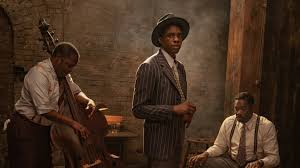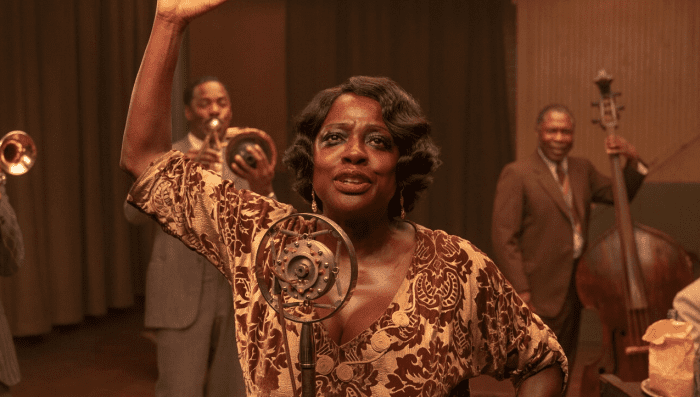Movie Review: Viola Davis celebrates the power of the blues in Ma Rainey’s Black Bottom
Reviewed by Jeffrey Sanzel
August Wilson, one of the foremost American dramatists, created the ten-play cycle The Pittsburgh Plays. The pieces explored different elements of the African-American experience, each work set in a different decade. The second play (and third chronologically) was Ma Rainey’s Black Bottom. Inspired by blues singer Ma Rainey, it was set in a fictional recording session in Chicago. It opened on Broadway in 1984, receiving strong press and running for 276 performances.
Netflix now offers an excellent film that enhances the stage production. George C. Wolfe has skillfully and sensitively directed a screenplay by Ruben Santiago-Hudson. Santiago-Hudson has wisely drawn the majority of the script from Wilson but has opened it up, most notably with a prologue showing Ma Rainey’s southern performance roots and the shift of African Americans from south to north in the Great Migration.
 The action shifts to the studio where the musicians await the arrival of Ma Rainey. The artists smoke, drink, and banter, and philosophize. But what seems like random chatter is a reflection of social injustice then and now. The men offer stories and anecdotes, with this slice of life elevated by Wilson’s honest and poetic words and exceptional performances.
The action shifts to the studio where the musicians await the arrival of Ma Rainey. The artists smoke, drink, and banter, and philosophize. But what seems like random chatter is a reflection of social injustice then and now. The men offer stories and anecdotes, with this slice of life elevated by Wilson’s honest and poetic words and exceptional performances.
Serving as the leader is guitarist and trombonist Cutler (Colman Domingo); Toledo (Glynn Turman) is the pianist and eldest of the group; Slow Drag (Michael Potts) plays double bass and Levee Green (Chadwick Boseman) is the rebellious trumpeter with big dreams. This quartet offer a glimpse into the challenges of being both black and musicians in the Chicago of the 20’s. The studio is run by Mel Sturdyvant (Jonny Coyne), whose mercenary tactics are slowly revealed. Irvin (Jeremy Shamos) is Ma’s anxious manager.
Ma Rainey (Viola Davis) arrives an hour late, setting off various complications. She is accompanied by her girlfriend, Dussie Mae (Taylour Paige), who has eyes for Levee, as well as her stuttering nephew, Sylvester (Dusan Brown), who she insists introduce the recording of “Black Bottom.”
What ensues is a battle of wills that represent issues of both music and race. While Ma appears to be difficult, it is really a matter of survival. She knows that she is being used by these white men, and they only cater to her as far as their needs. Viola Davis, possibly the finest actor working today, completely loses herself in Ma Rainey’s frustration and triumph. It is a flawless and mesmerizing performance of a woman who understands the nature of an unfair world.
 The film also marked the final performance of Chadwick Boseman, who sadly died of colon cancer at the age of forty-three. His performance is nothing less than brilliant, bouncing between Levee’s energetic and monomaniacal determination to create his own band and his inner demons. These lead to clashes with both Ma and his fellow musicians. His relating of his mother’s rape and his father’s revenge is one of the most chilling and raw moments in this or any film.
The film also marked the final performance of Chadwick Boseman, who sadly died of colon cancer at the age of forty-three. His performance is nothing less than brilliant, bouncing between Levee’s energetic and monomaniacal determination to create his own band and his inner demons. These lead to clashes with both Ma and his fellow musicians. His relating of his mother’s rape and his father’s revenge is one of the most chilling and raw moments in this or any film.
The entire cast deliver dimensional and wholly present performances, easily drawing us into this world where they face both petty and large demands at every turn. Their stories take different shapes, some metaphoric and others brutally and vividly real. There is not a false or wasted moment. It builds to a harrowing climax and an equally brutal and telling coda.
Ma Rainey’s Black Bottom celebrates the power of the blues, chronicling an important part of African American history. It is a reminder of art and of exploitation, of defiance and disappointment. It is also an exceptional film. Rated R, the film is currently streaming on Netflix.
Photos courtesy of Netflix







